EU ROMA WEEK 2021
On 28 September 2021 from 11.30-13.00h CET took place the online event “Do Roma Youth have a role in the implementation of National Roma Strategies up to 2030”. The event was part of the official agenda of the EU Romani Week 2021 and it was organized by the Phiren Amenca International Network. The discussion, moderated by Atanas Stoyanov from Phiren Amenca, brought together Members of the European Parliament, representatives of the civil society, the European Commission and the national Roma contact points of Bulgaria, Czechia, Hungary, Romania and Slovakia. Main points of discussions were at what stage of preparation are the national Roma strategies of the above-mentioned countries; whether young Roma are being included in the texts of the national Roma strategies; whether young Roma are being involved by the national Roma contact points in the National Roma Platforms and other processes; whether young Roma are being employed or given opportunities to take paid positions with the national Roma contact points; whether the upcoming Civil Roma Monitor will place better focus on young Roma.
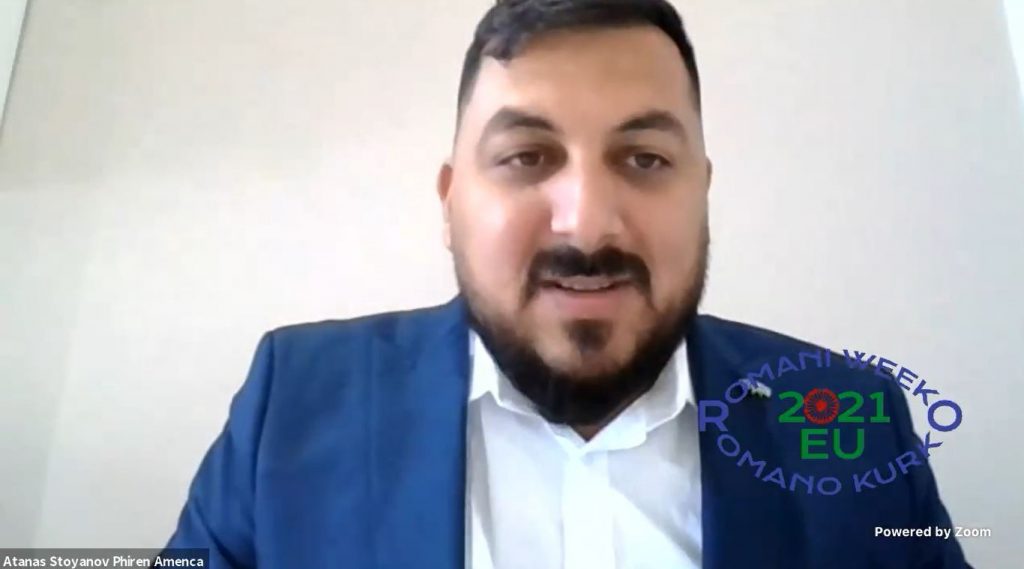
The Executive Director of Phiren Amenca – Marietta Herfort opened the discussion saying that the role of young Roma on the European, but also on the national levels, is getting more and more attention and it is being involved in the agenda of policy makers.
“Since the EU Roma Framework is guiding for the national Roma strategies and it pays a special focus on young Roma, we hope that you can also see the involvement of young Roma in these processes”, addressed the national Roma contact points Mrs Herfort. “We are also very happy that, again, we are part of the design of the EU Roma Week because this is the opportunity for young Roma to meet with decision makers in person; a moment when they can informally share their feedbacks” The Phiren Amenca Director continued her speech by sharing the testimonies of a few young Roma boys and girls from across Europe shedding light on the everyday issues faced by young Roma: persistent antigypsyism, prejudices and stereotypes from the side of the majority, but also the hardships many young Roma face in supporting their families, thus not having time to effectively take part in youth activism and in decision-making processes.
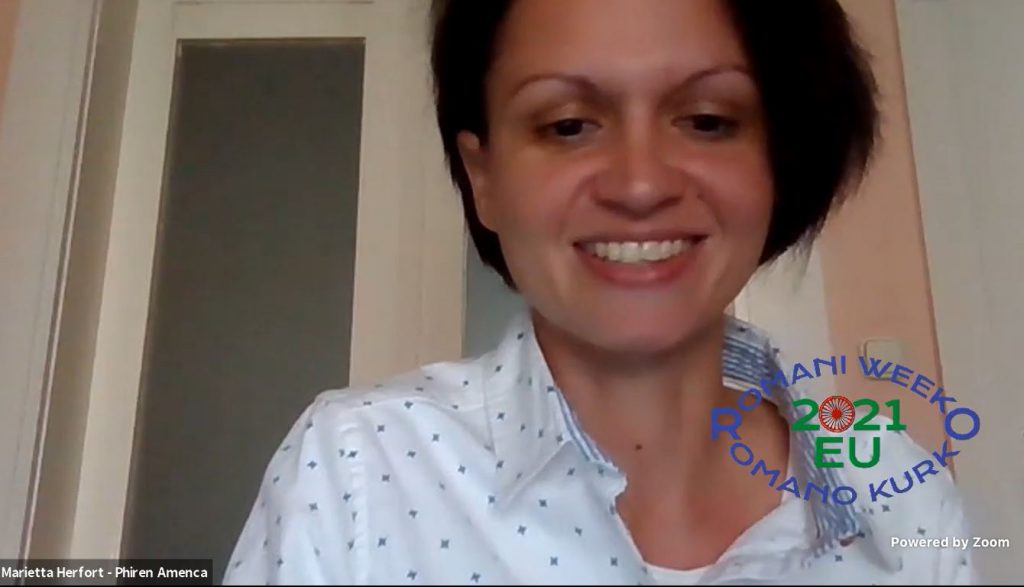
A special video-address for the event was sent by the Romani MEP Peter Pollak from Slovakia: “There are many documents that reconfirm the urgency of involving young Roma in the development of inclusion policies. There are many politicians who declare their ambitions to support Roma youth in becoming a driving force of the Roma inclusion process. However, reality speaks of
something completely different. We still haven’t worked our way from words to deeds. As you know in this month the European Commission should receive from EU Member States the strategies for ensuring Roma inclusion, equality and participation up to 2030. I wish that these strategies promote and support an active participation of Roma youth as the tool of inclusion. I will ask the European Commission how this aspect has been approached in its assessment and steps will be taken following its assessment.
One of the positive signals in this regard could be a greater involvement of young educated and competent Roma in the work and activities of National Roma Contact Points”, said in his address MEP Pollak.
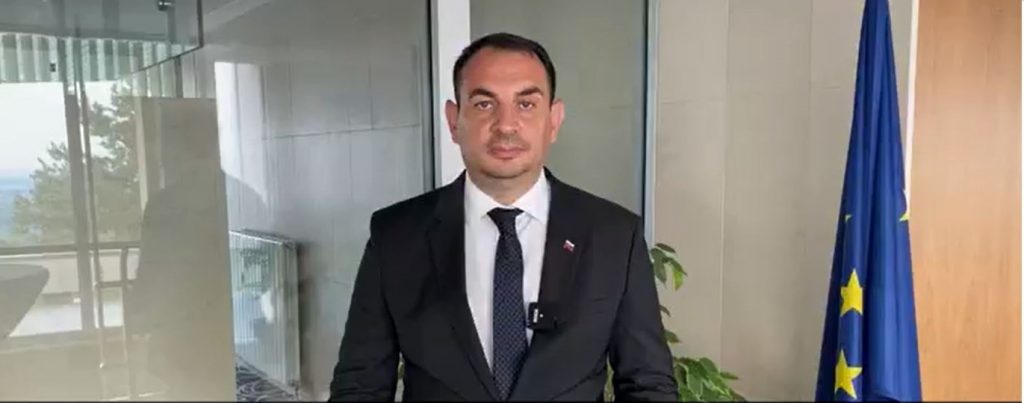
MEP Anna Donath, co-host of the EU Roma Week 2021 and Member of the Anti-Racism and Diversity Intergroup at the European Parliament also welcomed the guests of the event: “We have to highlight that there is an importance to support and empower Roma youth organisations, not just youth organizations. We have to work together, and we have to pay attention and highlight the importance of the issues of intersectionality. I can speak easily as a non-Roma youth because I don’t have to face antigypsyism on a daily basis, therefore I feel that I and other youngsters who have a voice already or who are loud enough, have a responsibility to fight against it, because it starts with us. We can’t wait for other generations to change their behavior. I’m ashamed when I’m looking at the Hungarian political elite, especially the governmental elite, their racist rhetoric and how they openly preach antigypsyism. This is not okay. But what I can do is to pay attention to my surroundings, my generation and educate them and the youngest generations. I think everybody has their own responsibility in this, but all together, we can bring the voice of youth to the decision-making tables because young know better what their needs are, and how policies can finally reach them, how they can change for the better in the future, what they should learn. Let’s look at the youth as an unlimited resource of information” MEP Donath said.
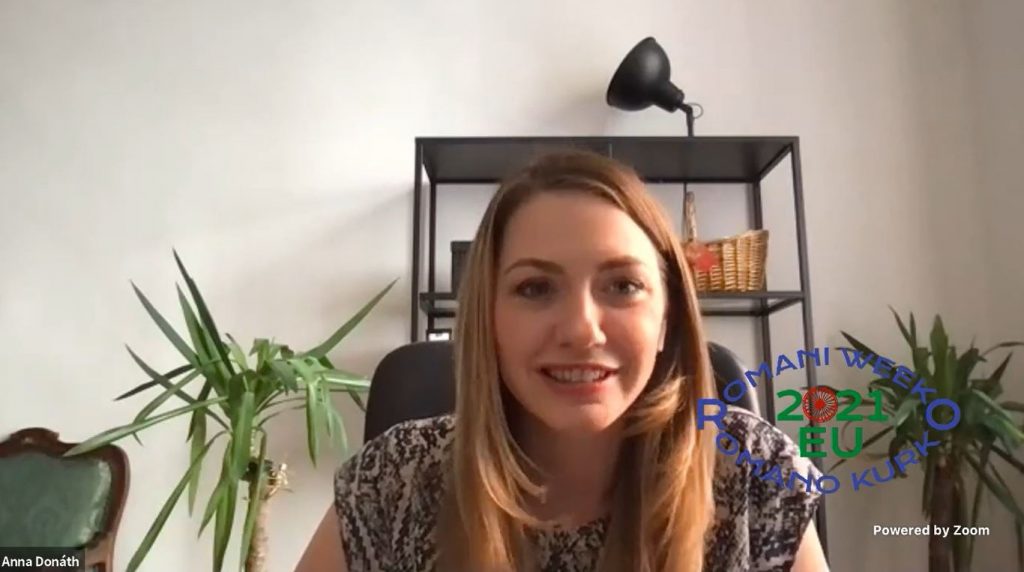
Marc Kiwitt from the Roma Team of the European Commission continued the discussion by stating that the EU Roma Strategic Framework was adopted on 7 October 2020, and compared to the previous framework, it adopts a comprehensive three pillar approach in which social and economic
inclusion is complemented with promoting equality, and also with fostering active participation of Roma in all aspects of political, economic and cultural life, and in all stages of the policy process. Mr Kiwitt stated that the new EU framework gives a stronger focus to the diversity among Roma and it
aims to ensure that national strategic frameworks meet the specific needs of different groups, including Roma women, youth, children, and also EU mobile citizens, stateless, LGBTIQ+, older Roma and those living with disabilities. In line with this stronger focus on participation, the EU Roma Strategic Framework aims to promote the empowerment of Roma young people and children in order to overcome socio-economic gaps, to fully exercise their rights and be active agents of change. Mr Kiwitt reminded that the Civil Roma Monitor project targets civil society organisations, including Roma youth organizations, in order to enable them to participate in monitoring and reporting on the implementation of the national policies and to strengthen the dialogue and partnership between Roma civil society, national Roma contact points, equality bodies and other
stakeholders, and also to provide civil society point of view on the implementation of national policies in order to compliment the reporting received from the member states.
Mr Kiwitt from the European Commission stated that there is also funding available to promote participation of young Roma under the new Citizens, Equality, Rights and Values – CERV program. At national level, the National Roma platforms are a very important instrument to promote participation of Roma including Roma youth in the policy process. These platforms have been created with the idea to mirror the European platform for Roma inclusion, and their role is further strengthened in the new EU-Roma Strategic framework, and also in the 2021 Council Recommendation on Roma equality inclusion and participation. The aims of these national Roma platform processes include ensuring effective involvement of all stakeholders and strengthening their participation. There is also funding to ensure that Roma youth organizations can monitor the implementation of the national Roma strategies as watch-dog organizations. National Roma platforms are expected to boost the representation, particularly of women and young people, in the platform structures including by nominating Roma representatives to ensure links between the national platform processes and the European platform for Roma inclusion. Member States are also invited to offer traineeships and junior positions to Roma youth in national structures linked to the implementation of the National Roma Platforms.

Deyan Kolev – Chair of the Center Amalipe NGO from Bulgaria continued the discussion stated that in the Civil Roma Monitor 2017-2020, the Roma youth were not a specific priority. Mr Kolev stated that not surprisingly, at these three years of reporting under the Civil Roma Monitor, the role of Roma youth appeared in fact in all the reports, because of the importance of this group. The Chair of Amalipe stated that currently a group of Roma organizations from Bulgaria insist that the final Bulgarian Roma Strategy for the upcoming period includes specific chapters on Antigypsyism, Participation and Roma youth, women and children as being the most vulnerable categories among Roma.
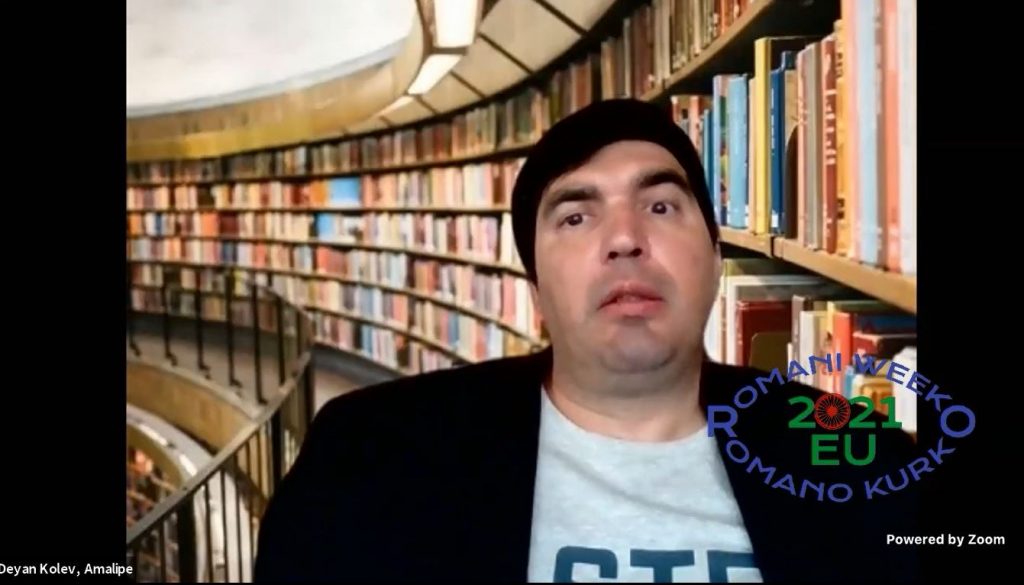
Mrs Elena Iordanescu, National Contact Point for Romania shared that the final draft of the Romanian National Roma Strategy 2021-2027 has been submitted to the Romanian Prime-Minister and it will be approved in the coming period. The final touch is to be provided by Romanian National Agency for Roma who needed to provide an additional information from Roma communities, therefore to adjust all the measures. Besides that, currently the Romanian NRCP is implementing the second stage of the National platform for good practices for Roma funded by DG Justice which aims to offer at the end of the project an interactive map of the most vulnerable communities of Romania and their most urgent needs. Through this project, the Romanian NRCP succeeded to have young Roma 8 interns for the entire duration of the project – 1-2 interns for a period of 5 months in a length of 20 months. Mrs Iordanescu forwarded the floor to Alexandru Stan, 20-yearls-old Roma student in Law – current intern at the Romanian NRCP who said that as a young Roma intern at the NRCP he feels empowered and his voice heard. The concluding message of Alex was that all Roma across the world speak only one language and this is the language of justice.
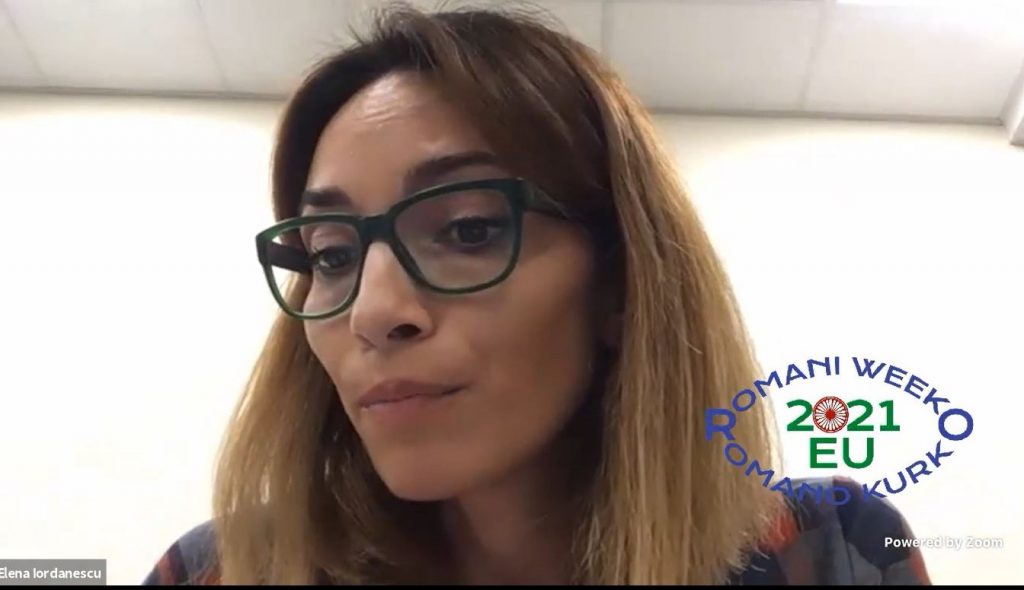
Mrs Rositsa Ivanova – the National Roma Contact Point of Bulgaria shared that they currently implement a National Roma Platform project funded by the DG Justice for the third time where 10 young Roma are contracted to become community facilitators and to ensure that local Roma strategies take into considerations the real needs of local Roma communities. Further will be
nominated a young Roma to ensure the link between the national Roma platform and the European Roma platform. The Bulgarian Roma Strategy is still not submitted to the European Commission because of the political changes in the country but the political assurance is that the national strategy will be submitted by the end of the year.
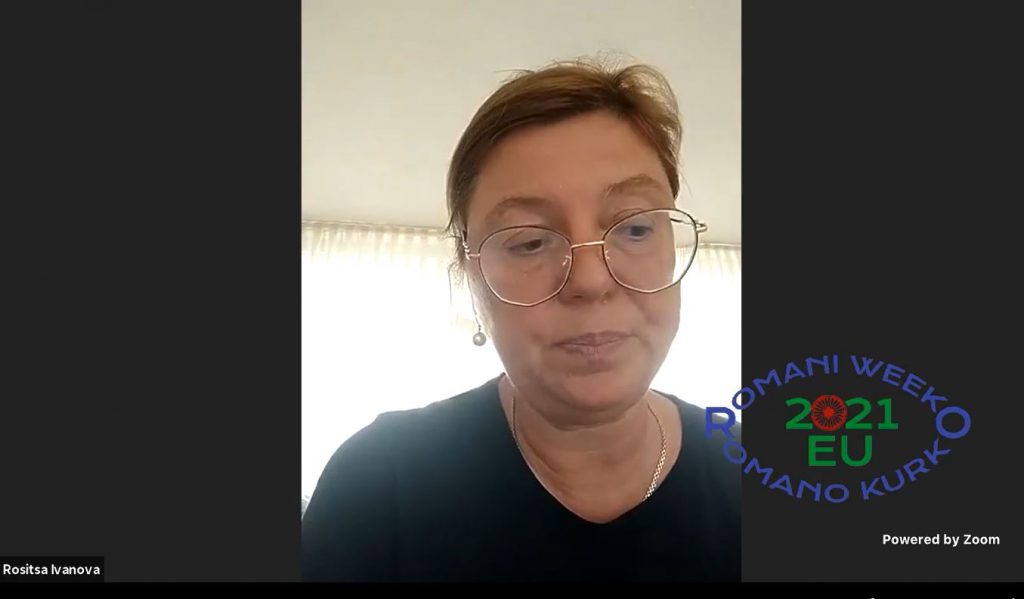
Mr Laszlo Ulicska – the Hungarian National Roma Contact Point stated that the Hungarian National Social Inclusion Strategy up to 2030 has been adopted by the Hungarian government in August 1. The Strategy pays attention to young people by not explicitly targeting Roma and Roma youth. The strategy covers various matters such as tackling poverty, social exclusion, housing, early marriages, birth-rate, drug abuse, human trafficking and prostitution. One of its main targets is to reduce the indicator of households with children living in social and material deprivation by 10% until 2030 compared to 2019. Mr Ulicska highlighted the system of Roma vocational colleges and in this context, support for social organizations for Roma youth.
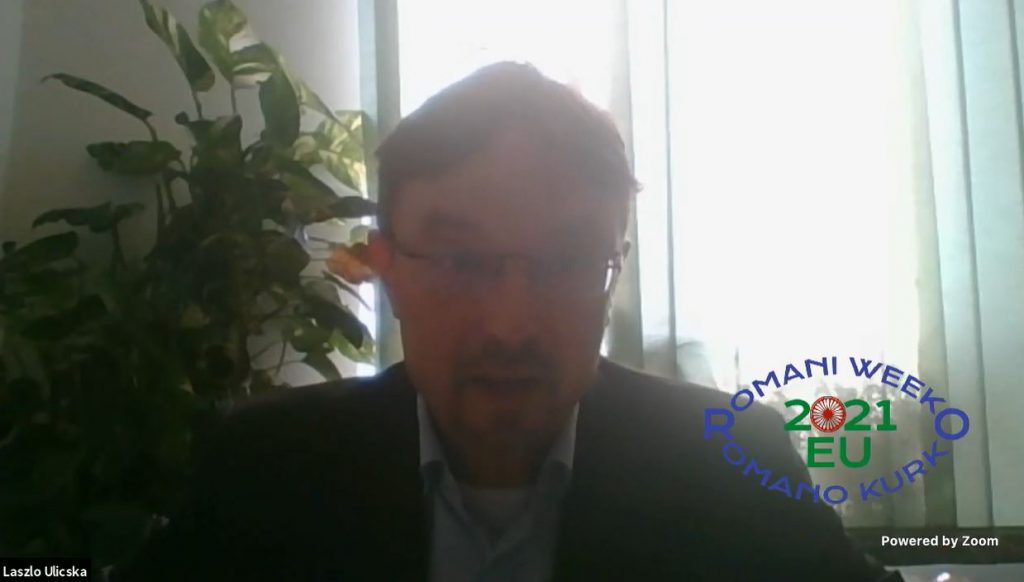
Mr Martin Kocanda – the Czech National Roma Contact Point mentioned that the new Czech Strategy for Roma Equality, Inclusion and Participation 2021-2030 was adopted in May 2021. This is the first time when Roma people themselves took place in the preparation of the strategy. It identifies several challenges, among them absence of data on the situation of young Roma in
Czechia, drop-out of Romani students from secondary education, and further failure of involvement in tertiary education. Mr Kocanda stated that the percentage of Czech young Roma NEET (neither in education, employment or training) is 6 times higher compared to non-Roma youth NEET. In the end
of his speech the Czech Roma Contact point said that it is important young Roma to be part of the Government Council for Roma Minority Affairs and various working groups, and thus practically involve in the implementation of the new national Roma strategy.
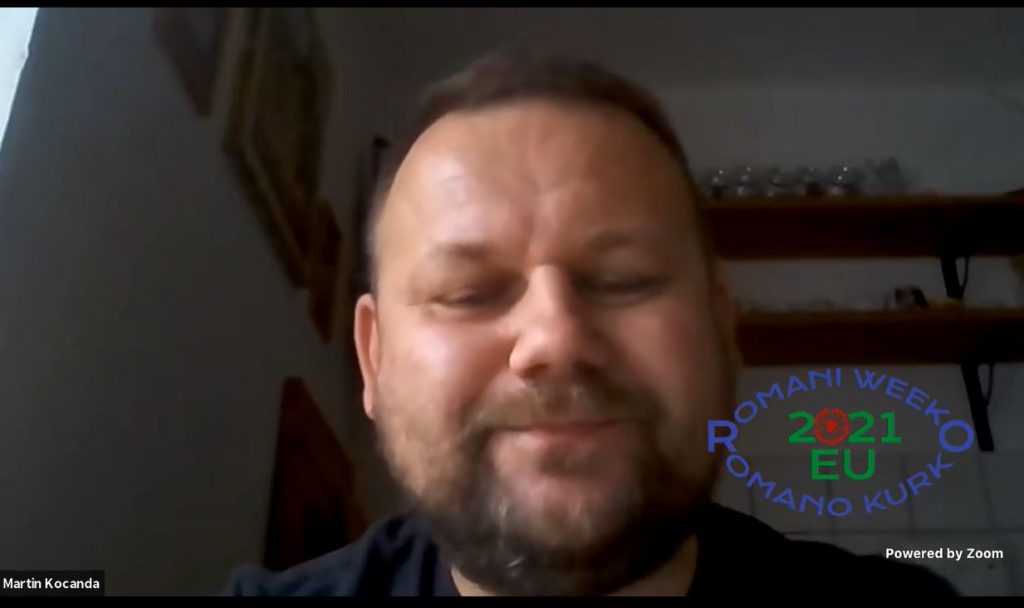
Marek Chomanic, Director of the Department of Concepts and Analysis from the Office of the National Roma Contact Point, Slovakia said that the Slovak Strategy for Equality, Inclusion and Participation of Roma until 2030 was adopted in April 2021 containing lots of measures targeting young Roma in the field of education, health, employment, culture and others. Currently an Action Plan 2022-2024 with concrete measures and activities is being prepared. The Office of the Plenipotentiary for Roma in Slovakia created an Advisory Body in the field of youth to promote an active approach for involving young Roma with currently having 6 Roma young people as members. The Slovak NRCP is planning to extend this number to 15. These young Roma will be also part of the National Roma platform and regional Roma platforms and their task will be to present and explain the new strategy to young Roma from the different regions. Currently is being prepared a special, youth-friendly version of the Slovak Roma strategy where the bureaucratic is simplified. The strategy will be also distributed to community centres. Besides that, the Roma strategy is being
presented at schools and universities. The internship program for young Roma is also available at the Slovak NRCP. Currently stopped because of COVID-19 the program turned to be a success, especially for 2 Roma interns who got employed at the NRCP in the end of their internship.
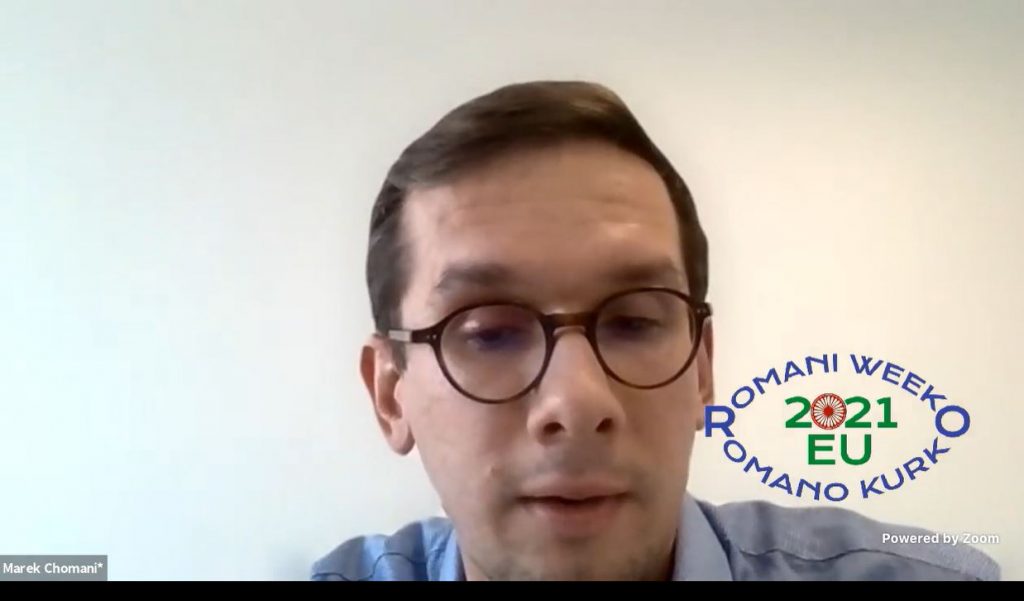
The discussion ended with questions and answers.
The entire record of the discussion you can watch here.


